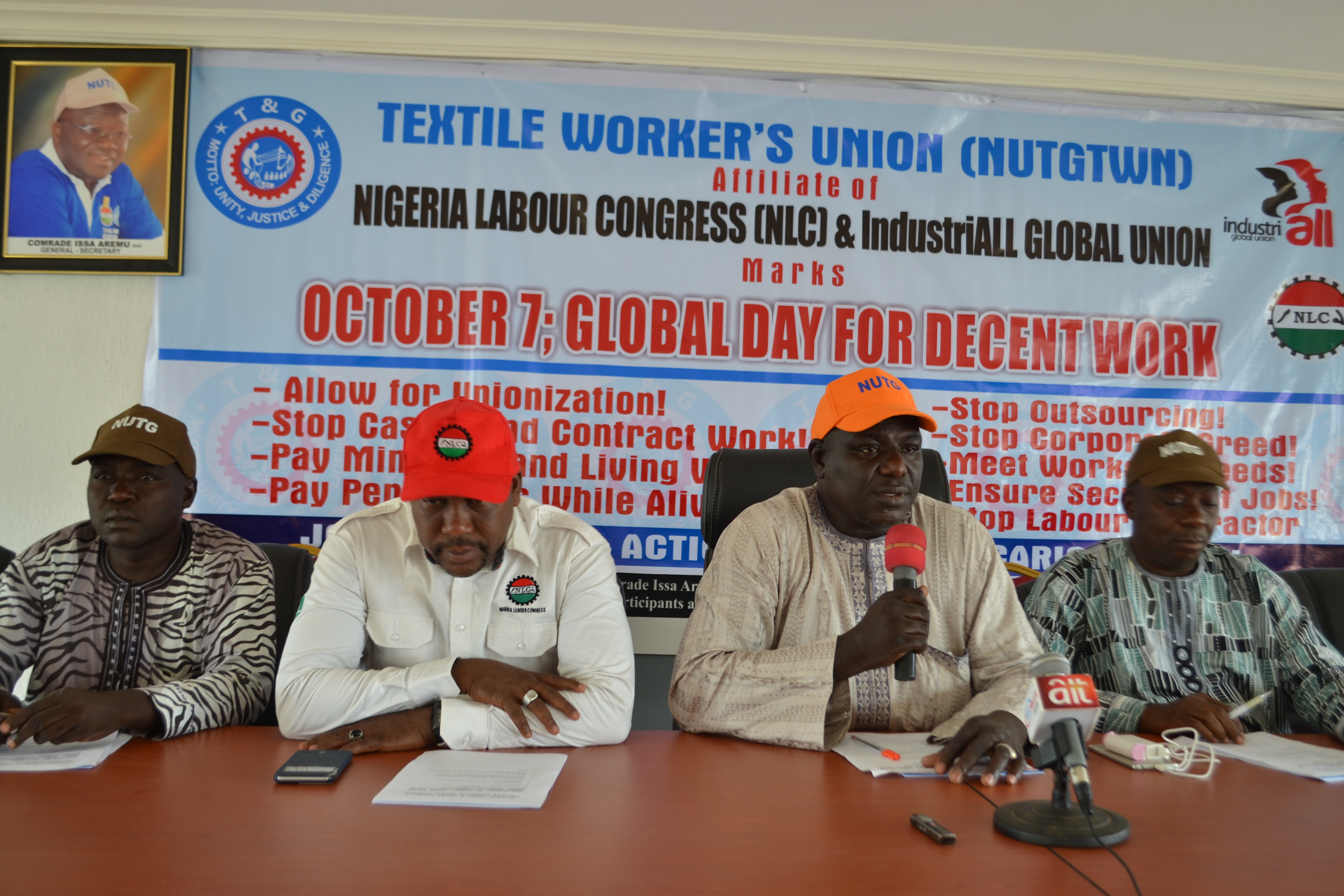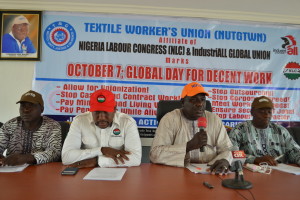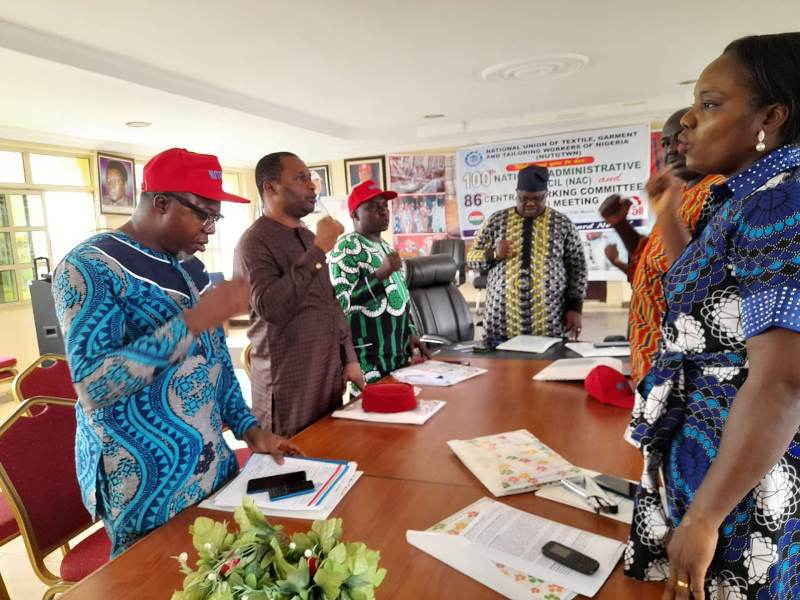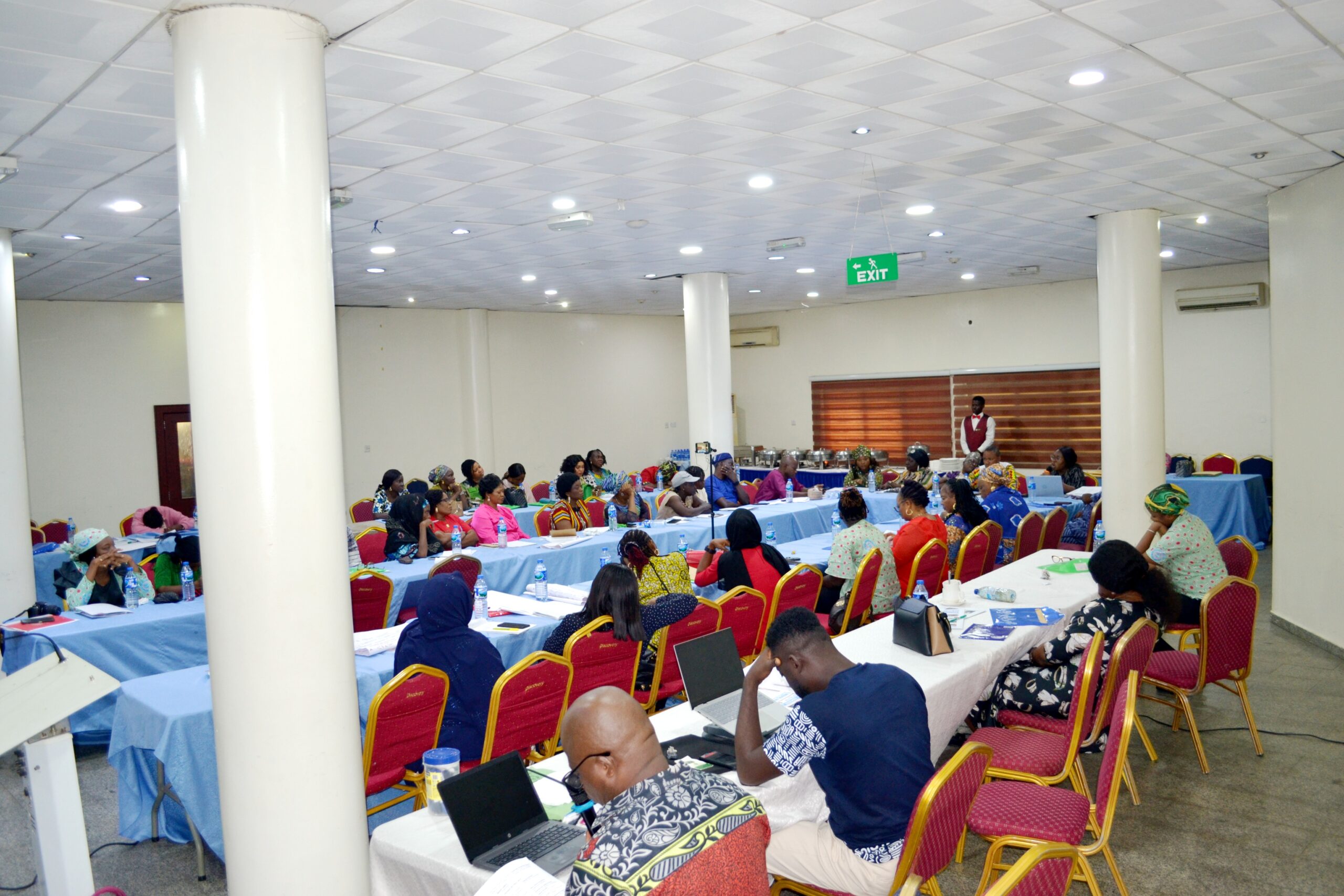
OCTOBER 7
Tomorrow Friday October 7 is a global day of mass action for Decent Work, a Day of mass action against precarious work. Tomorrow National union of Textiles, Garment and Tailoring Workers of Nigeria an affiliate of IndustriALL global union proudly joins other affiliate unions of the global union in Nigeria and world wide to observe the day. We therefore call on all our members and allies in civil society to join us in a mass solidarity action for decent work.
IndustriALL GLOBAL UNION
IndustriALL Global Union represents 50 million workers in 140 countries in the mining, energy and manufacturing sectors and is a force in global solidarity taking up the fight for better working conditions and trade union rights around the world. We salute the NLC leadership for organizing mass protests in Abuja and Lagos tomorrow drawing government attentions to the plight of casual and unprotected workers.
PRECARIOUS WORK
Precarious or casual work is the work done by workers under terrible conditions of low pay, delayed payment and general insecurity. Precarious work is becoming norm in most workplaces in Nigeria with most employers taking advantage of mass unemployment to violate workers’ rights. More and more precarious workers are unable to realize their fundamental rights at work and enjoy essential social rights. As we have seen in recent times with serial tragedies involving applicants and extortion of applicants in immigration, police and customs services, recruitment of workforce is also getting precarious in Nigeria.
Most affected are women and young workers in general. In many commercial banks for instance precarious work takes the form of agency work in which a labour contractor supplies workers to the banks but the workers still remain the employees of the contractor. These workers are known as contract workers or temporary workers. Most banks today are mere modern day slave trade terminals reminiscent of the despicable trans-Atlantic slave trade of 15th century in which young girls are employed under corporate prostitution scheme and paid slave wages. Only lucky workers ever get elevated to the permanent status in most banks.
The defining characteristic of casual labour is insecurity, lack of union and all forms of maltreatment. Many media houses in Nigeria are notorious homes of casual labourers with working journalists grossly underpaid and in many instances unpaid at all drawing on cheap labour of youth corpers and interns. In many local governments and even Federal departments, child labour is feasible with outsourced staff some receiving as small as N3000 a month. There are “auxiliary workers” at the health centres just as there are “auxiliary teachers” in hundreds of thousands of “schools”. “Auxiliary” workers are nothing but casual workers. Even churches and mosques which should know what Almighty God ordained with respect to dignity of labour offer their workers devilish dirty jobs and pay them peanuts. Many pensioners earn less than N10,000 and statutory minimum wage of N18,000 in the face of massive currency devaluation and inflation. High sounding Youth Employment Schemes, YES, and “entrepreneurship schemes” being paraded at the state and federal levels supported by donor agencies are nothing but euphemisms for casualisation. Major industries with well known brands run by respectable men and women with advertised Corporate Social Responsibility (CSRs) practice outsource major operations.
In many manufacturing industries including some remaining textile mills, temporary shortage of raw materials such as cotton has been used to casualize normal regular work through “dubious compulsory leaves” totaling 52 days in a company last year!. It is an open knowledge that in the energy sector, owners of Gencos and Discos are more effective in laying off their workers than guaranteeing uninterrupted electricity supply. Of course the story of casualization is familiar in construction industry. Every burden of production is heaped on the backs of working men and women! The word “recession” or “economic crisis” has become cheap excuse for mass “industrial murder” called retrenchment and downsizing.
NO ECONOMIC RECOVERY WITHOUT DECENT WORK
Comrades, Nigeria is no doubt currently undergoing economic recession. The country definitely faces the problem of limited revenue due to decline in crude oil price and crude oil production. However Nigeria is rich in human (labour) resources. Nigeria’s economic recovery depends on how it treats its 80 million real and potential workforce. Nigeria has progressive labour laws which sanction permanent employment as opposed to casual labour. Our labour laws ensure health and safety at work, pensions after work and regular payment of salaries as well as protect the rights of workers to freely join trade unions of their choice. Sadly these labour laws are being violated by many employers and even some state governments which unacceptably own salaries for months.
President Buhari’s administration must urgently reform the labour market to enforce the existing progressive labour laws with respect to security of jobs and incomes of the workers in order to motivate for greater productivity for development and economic recovery. Only permanent secured, well paid workforce NOT Casual workers will work Nigeria out of recession. Precarious work fuels precarious economy while secured works ensures economic stability and prosperity. President Buhari must therefore constitute the tripartite wage review committee including labour, employers and government to negotiate new minimum wage long due for another five-year review.
COMMENDATION
We commend President Buhari for coming to the rescue of some states through bail out for payments of salaries. But the President must impress on these states governors to show that the monies are not diverted and workers’ salaries are paid. We commend the recent intervention of the Federal Minister of Labour and Employment, Senator (Dr.) Chris Ngige in protecting the rights of bank workers to secured jobs. The Minister after NLC mass protests also positively intervened to get Justice for Nasarawa workers whose wages were arbitrarily cut by Nasarawa state governor, Alhaji Tanko Almakura. We also appreciate when Senator Ngige warned states governors against minimum wage cuts and against governors’ arms twisting their civil servants to become emergency farmers. However as good as these official interventions are, the ministry of labour will do better with preventive intervention than belated intervention after the rights of workers had been violated beyond redemption as seen with the callous killing of 2 Nasarawa workers.
TRADE UNIONS MUST RISE UP TO DEFEND MEMBERS’ RIGHTS
The burden ultimately is on unions and we the trade unionists workers pay through union dues to protect them. Trade unionists must stop treating their members “casually” and look the other way and in some instances criminally collude with unscrupulous employers to violate workers’ rights. We must kill casualization and precarious work otherwise precarious work will kill our members! Contract and casual employments are no jobs, “but crimes against humanity”.
LABOUR UNITY
To do this, all unionists must be united and stop the ongoing divisive leadership tussles. If we operate separately precarious work will defeat us collectively.
OUR RESOLVE
We hereby resolve as affiliate of IndustriALL to reaffirm our commitment to fighting against precarious work in all its forms. We also resolve to promote permanent secured employment. Tomorrow with our allies, we take action to STOP Precarious Work, in companies, government departments and in industries.
We will also raise awareness among unions and the public on how precarious work undermines workers’ rights and impacts on Nigerian economy. We also resolve to develop action plans and campaigns to organize precarious workers into unions and to secure their rights.
We also demand collective agreements that limit the use of precarious work, that convert precarious work to regular employment, and that improve the working conditions of precarious workers and protect their rights.
We demand that governments eliminate policies and legislation that encourage precarious work, and remove all legislative and other barriers that deny precarious workers their rights. All workers must exercise their fundamental rights to join a union of their choice and bargain collectively. We demand equal access to social protection for precarious workers. There is really no alternative to a regular employment where the employee can take part in union activities and fully express his or her constitutional rights of free movement and association.
LONG LIVE DECENT WORK!
LONG LIVE TEXTILE UNION!!
LONG LIVE INDUSTRIALL!!!
LONG LIVE NLC !!!!
LONG LIVE FEDERAL REPUBLIC OF NIGERIA!!!!
Thanks!
Being text of press briefing by Comrade Issa Aremu, mni
General Secretary, National Union of Textile & Garment Workers of Nigeria (NUTGTWN), NEC Member, NLC,
Chairman, IndustriALL Global Union, Sub Saharan Africa









